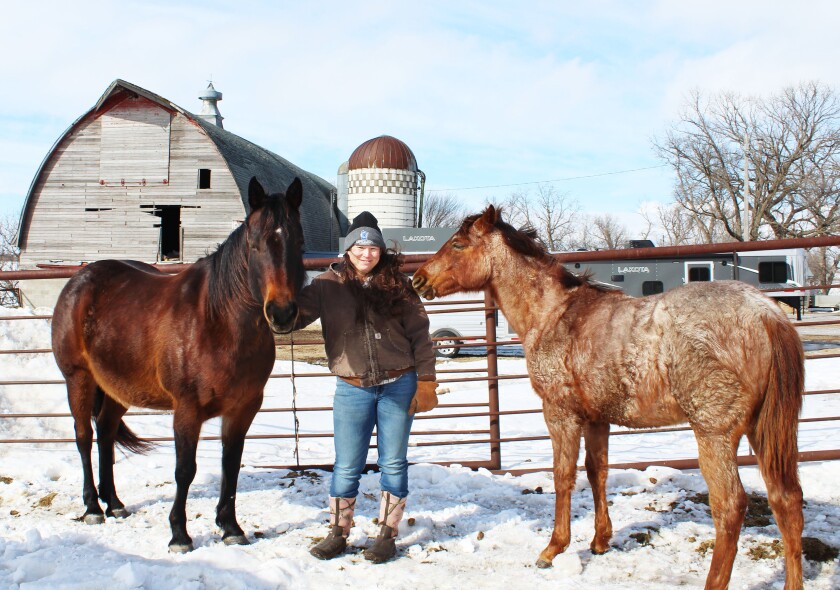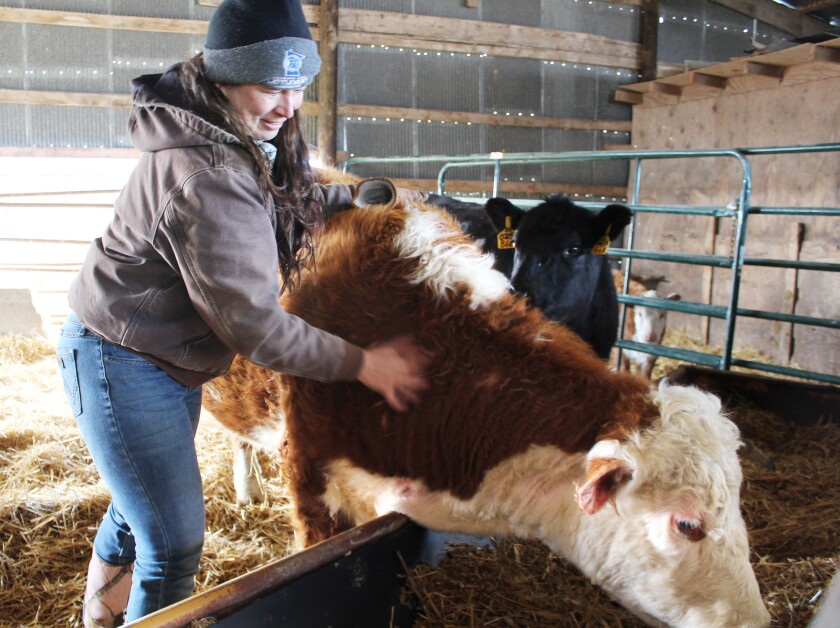FARWELL – Kelly Anderson has worked for the Minnesota Department of Agriculture since 2009. She has worked in a few different areas, but is currently a grazing/livestock specialist.
“I am passionate about what cattle can do in conservation and I love to see how cows can help improve soil, improve grassland and more,” said Anderson, a 1996 Alexandria graduate who lives on a farm near Farwell with her husband, Bill, and their two children, Jack and Lily. “I am really hoping that we can do more incorporating cattle into some of our crop lands to really help build that soil fertility. It’s a whole movement, regenerative agriculture, and it is a big deal.”
Didn’t grow up on a farm
Anderson hasn’t always had a passion for the farming industry, although she has always had a passion for animals.
She grew up on the east side of Lake Ida. She always wanted a horse and was always begging her mom and dad to buy her one. One summer, she saved up enough money and rode her bike to Arrowwood Resort so that she could take riding lessons at the stables. She also had a cousin who had a horse and would spend time riding at her house. And every summer she would spend a week at her grandparents’ farm.

Contributed photo
Anderson now owns three horses – two purebred quarter horses, Kaycee and Akadia, and Alpo, her Arabian.
ADVERTISEMENT
After high school, Anderson headed off to college to study biology with a pre-med and physiology focus. Her original plan was to go to med school. But after four years of college she decided med school was not what she wanted, so she started looking for a job. But then she met her husband who grew up on a farm two miles from where they live now.
“He was milking cows and I got to spend most of the summer coming out here and helping out,” said Anderson. “I really got to liking it – and liking him – and we decided to get married. I very quickly learned what farming was.”
Farm life is her passion
And now it is her passion and a way of life she loves.
Coming out of college with a liberal arts degree in biology and moving to the “southern suburbs of Farwell” Anderson didn’t find many job opportunities in her field. She bounced around for a bit doing different jobs, but then landed a job with Douglas County as a feedlot officer and that is where her career in agriculture really got started.

Celeste Edenloff / Alexandria Echo Press
Although she now works full-time for the MDA, Anderson works on their beef cattle farm as much as possible. Most of her work with the MDA is done from home unless she is out in the field or at another farmsite. Her favorite part of her job is when she works with farmers to use cows to help manage public land.
“Because we are in a prairie or what used to be a native prairie, in order to keep things nice and healthy, it requires regular disturbance,” she said. “And that has been done historically by fire or by grazing. So I help with the grazing part.
Her work with the MDA is a passion because she believes 100% that cattle and conservation belong together.
But her work at home on the farm is also a passion. She loves her animals and she likes the interaction of the cattle on their land.
ADVERTISEMENT
Farming is rewarding
She and her husband run a cow-calf operation and have nearly 150 beef cattle on their farm.
It’s the biggest operation they’ve had – about double what they normally have. Her husband recently retired from working for the railroad and now has more time to spend on the farm, she said.
“Farming can be hard, but it is so rewarding,” she said. “I mean every day you’re facing decisions that are literally life and death.”

Celeste Edenloff / Alexandria Echo Press
She shared how they had a cow that had a calf about six weeks early and that they didn’t find it right away. By the time her husband found it, he said the calf had about a 1% chance of survival. But they did everything they could to help it survive. Unfortunately, it didn’t. But she said at least they tried everything they could do for it.
Not long after, they had a similar situation and the calf survived.
“The only difference is it was born on an 80-degree day and the other one was born on a 20-degree day,” she said.
She said the calf was named Hero Guy even though it was a girl and quickly became one of her husband’s favorites.
“She is a girl but she identifies as a hero. We’re all inclusive here,” she said. “Hero Guy is now a big, big heifer.”
ADVERTISEMENT
Cows get a bad rap
When asked if there was anything she wanted people to know about farming, Anderson said that cows sometimes get a bad rap and are often used as scapegoats.
“I would encourage people to take a closer look at what farmers have done to improve over the years and how much more efficient we’ve become at producing beef,” said Anderson. “If you want to do a meatless Monday, that’s fine. But the impact you are making is much less than that trip you took to the restaurant to have that meatless Monday. I don’t know a single farmer who doesn’t give their all for their livestock, especially for their livestock. You are dealing with life and death and the death part sucks, until it is planned and the steak is on your plate.”
And if you want to know her favorite cut of meat, it’s brisket, although she said she loves a good skirt steak, too.
